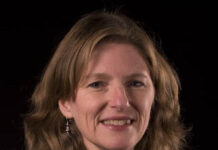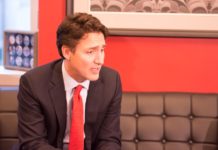The portrait of founding president Gerald Hagey looms large over the spacious room of Ira Needles 3407. This is where the UW Board of Governors meets four times annually, as they did yesterday, April 16, for their last meeting of this academic year.
According to the University Secretariat, the Board of Governors is “responsible for the governance of the University including control of its property and revenues, the conduct of its business and affairs, except such matters assigned by the University of Waterloo Act, 1972 to the Senate.” The board is chaired by Murray Gamble, a Waterloo alumni, entrepreneur, and representative from the community at large. These meetings are open for the student body and general population to attend, aside from the concluding confidential session, which is restricted to board members.
The meeting length was scheduled for 210 minutes and featured various agenda items shared beforehand on the university’s website. The most significant are described below.
President Report
The university president is responsible for informing the board on various matters that affect the institution and its people. In this way, the president acts as a central node that binds all the different committees, faculties, and offices together into one coherent institution.
President Goel spoke about more than a dozen current issues, priorities and ongoing developments in his report. These included:
- The “Waterloo at 100” project and the need to define the values and characteristics of the university. FAUW president David Porreca asked how accountability (one defining the value of ‘Waterloo at 100”) is likely to manifest in practice, to which Goel responded with “the key thing is holding each other accountable.”
- The Freedom of Expression and Respectful Engagement Task Force and its ongoing search for members. Goel said this task force was created following the June 2023 Hagey Hall attack, and has been further developed in response to “issues in the Middle East.”
- The federal government international study permit cap. Goel remarked that the university will still enroll around the same international students as 2023/2024; however, by last year, this number had already dropped from previous highs. “The very top talent in the world has many choices in terms of where they go,” he said. “Given that Ontario was weeks behind the other provinces in resolving this, those applicants might have taken offers elsewhere.”
- The federal government’s housing plan and the proposal to remove the goods and services tax from the construction of new residence buildings. This will potentially save the university $2.1 million dollars on their new residence.
- The “Cutting Red Tape to Build More Homes Act,” which Goel stated was ironically named because it requires the creation of additional reports and bureaucracy and represents a “continued intrusion into university autonomy.”
- The “Moving to a Smoke-Free University” project. Goel affirmed that as of July 2024 UW will become a smoke-free campus, joining over 100 postsecondary institutions in adopting such a policy. Goel clarified that traditional Indigenous cultural or spiritual smudging ceremonies will be exempt from this policy.
- The Indigenous Outdoor Gathering Space. Goel stated that the goal remains to open the area by this fall. Student Senator Catherine Dong asked if consideration was given to environment and sustainability in the design and material use of the space, to which Goel responded that the lead architect was Indigenous and worked with the local community to select sustainable materials.
Buildings and Properties Committee Report
Provost Jacinda Reitsma spoke to this report due to the absence of committee chair John Saabas. She stated the committee identified buildings most in need of renovation projects, in line with the practice of “deferred maintenance.” She added that renovation projects currently pose quite a challenge for the university, given the aging infrastructure and rising costs. Dong asked where the committee is “hoping to land on emissions reductions.” Reitsma deferred the question to Mat Thijssen, director of sustainability at UW, who has helped to develop the university’s Neutral Climate Action Plan. Thijssen said that this information would be provided in the annual sustainability report in the fall.
2024/2025 Operating Budget Approval
The most time consuming agenda item came from the finance and investment committee, mainly due to the discussion surrounding the university’s operating budget and investments. Provost James Rush gave a lengthy talk that had two concrete sections – causes of the substantial projected deficit increase, and plans to address it in the upcoming fiscal year. He explained that the sharp rise in the total deficit from last year can be attributed to increasing expenses and decreasing tuition revenue. Salaries and benefits are projected to rise by $36.3 million, while tuition revenue is set to drop by $29.9 million, leading to a projected deficit of $74.5 million.
Rush emphasized that UW, being a people-intensive organization, will naturally derive much of its expenses from labour. He presented the committee’s plan to address the deficit, which includes an ongoing 4 per cent faculty budget reduction ($24 million) and a 28 per cent central fund budget reduction ($15 million), along with further budget cuts in these areas for the 2024/2025 fiscal year. If executed correctly, this would shrink the projected deficit to $42.5 million.
Several questions arose from board members about the consequences of such spending cuts. After claiming large deficits are an “artificial issue” due to the provincial government’s declining support for postsecondary institutions, Porreca inquired about the impact that the $20 million central fund reduction could have. Rush admitted that the reduction poses a short-term risk, and does not represent a “sustainable approach to managing a balanced budget,” but that this would give a “runway” to properly manage the budget in the future. Linda Blair, chief experience officer of Deloitte Canada and appointed board member from the community-at-large, expressed further concern over reducing expenses, and what the university “won’t do” because of it. Goel responded, “it’s not necessarily specific things we won’t do, but we will certainly have to slow on projects,” listing the “Student Information System Transformation” as an example, a project that was brought up repeatedly throughout the meeting.
Mayor of Waterloo and board member Dorothy McCabe expressed concern over the current budgetary deficit, commenting that the city and the mayor’s office “want a vibrant UW.” She also asked Goel about what his office has heard from the province regarding the issue of unfreezing tuition. Goel said that further changes to funding for universities is not popular at the polls, and consequently, is not being focused on by any political party. “No one wants to campaign on un-freezing tuition,” he punctuated.
There was verbal disagreement over the issue of endowment investment ethics, primarily between board members Jagdeep Singh Bachher and Nasser Mohieddin Abukhdeir. Abukhdeir asked Rush if these investments were aligned with UW’s new value system defined in “Waterloo at 100,” and how such ethical financial behaviour would be enforced. Bachher, who manages a $164 billion portfolio as the chief investment officer at the University of California, was keen in responding to this question, stating that although values are important, they should not supersede the board’s fiduciary duty to manage the assets of the university. He further stated that he would like to see the university become more aggressive, and break away from the “traditionally conservative investment strategy” of UW. Later on, Abukhdeir responded to Bachher, saying “I absolutely do not agree that our fiduciary duty as governors requires us to condone making money independently from our values,” further claiming that the youth “want a progressive future” and that further scrutiny over investment values was not an issue. Although discussion on this point ended with Abukdeir’s comments, Gamble said this would be further discussed at the board’s next meeting in June.
Marc Aucoin, associate chair of engineering, recommended that the committee make a clear, itemized list of strategic priorities, as a “cloud of confusion” is created around these items if not communicated properly, and Rush agreed.
Following this, Gamble advised that, unless someone had a plan to reduce the deficit by $1 million, that the motion be brought to the floor, as the meeting was already running over time. This received considerable laughter. The motion was passed unanimously.
Policy 76 and 77 Amendment
Another motion was brought to the floor by Rush – an amendment to policy 76 and 77. Amending these policies, relating to tenure and promotion of faculty members, has been in the works since September 2014, prompting Gamble to call it “a historic motion” led by FAUW. President Porreca followed Rush’s remarks by explaining that support for the amendment received a majority from both professors and lecturers upon consultation, prompting them to move forward.
A few questions were raised, mostly relating to the exact changes that would be made to the faculty teaching stream. Teresa Fortney, a community-at-large elected board member and former corporate financial executive, asked about reductions to the number of courses that faculty are required to teach, as this amendment would mandate a 12 course maximum over a six-term period, and would guarantee one non-lecturing term over this same timespan. An appointed expert working on the policy answered, stating that the goal is to improve overall teaching across the university, giving more time for faculty members to develop curricula, improve methods, and pursue other goals that impact teaching. He also stated that it is abnormal in other institutions to not grant a summer break to faculty members, and that this reduction in term requirements brings UW closer to best industry practice.
Nancy Heide, director of the Student Service Centre, suggested an amendment be made to remove all instances of the pronouns “he” and “she” in the policy, to be replaced with “they.” Porreca objected, stating that this was not a substantial enough change to justify reopening the policy to renegotiation. Following this, Goel said now was “not the appropriate time” to modify the amendment in such a way, but that “there is going to be a major review of the language in all of our policies.”
Once the motion was raised, the board voted unanimously in favour of the amendment, officially changing policy 76 and 77 after almost a decade of negotiation.
Amendment to Policy 3 and 43
The last amendment of the open session was addressed by Rush regarding sabbatical leave. According to Rush, policy 3, 43, and a variety of memos from previous provosts address issues of paid leave in ways that are often redundant and ambiguous. This amendment would work to “maneuver a policy” that is more coherent, aiming to retire policy 43 and certain provost memos, and add to policy 3.
With no questions or comments, the motion was unanimously passed.
Following the amendments to policy 3 and 43, Gamble asked the board if there was any other business that members wished to address. As no further business was raised, the meeting was adjourned for 10 minutes. At this time, Imprint was informed that the board would be entering the confidential session, and that all non-members would have to leave. Although the meeting was scheduled for another 55 minutes, no further information from the session can be reported on.






























